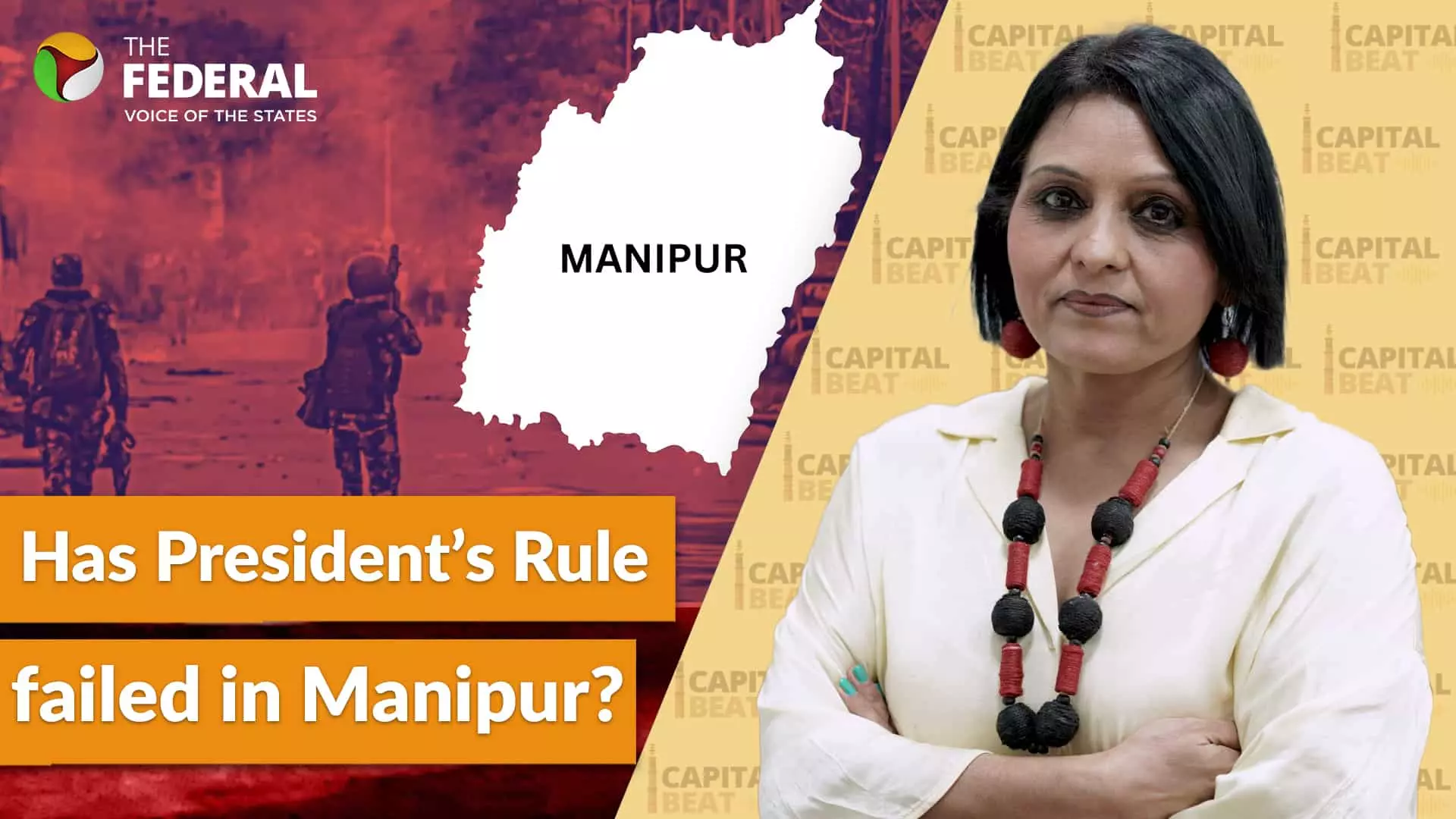
Manipur crisis: Why is Amit Shah still relying on Biren Singh?
Shah has reached out to Biren to help with the restoration of normalcy in Manipur; is the state beyond the bounds of President's Rule?

In this episode of Capital Beat, host Neelu Vyas, along with Professor Xavier Mao and Prasenjit Biswas from North Eastern Hill University, and senior journalist Samir Purkayastha from The Federal, discuss the ongoing turmoil in Manipur.
The panel debates whether President's rule, enforced in the state since February 2024, has faltered in quelling violence, the triggers of recent clashes, and why Home Minister Amit Shah continues to back former chief minister N Biren Singh.
Causes of recent violence
The recent flare-up in Manipur, sparked by the arrest of an Arambai Tenggol leader, deviates from the Meitei-Kuki clashes that have long plagued the state.
Purkayastha clarified, “This cycle of violence was targeted against the government, not between communities.” Protests, including a 10-day ban by Arambai Tenggol, disrupted daily life until its withdrawal due to shortages.
Also read: Manipur govt lifts prohibitory orders in Imphal valley districts
While direct clashes have decreased, Manipur remains fragmented. Purkayastha noted, “There is complete balkanization. People from one community cannot go to areas dominated by another.” This division has halted trade between Kuki hill areas and the Meitei-dominated Imphal Valley, severely impacting the economy.
Professor Mao said he sees some progress in the state. “Violence is much less compared to the past. The arrest of Arambai Tenggol members and Kuki volunteers is a positive step,” he said, adding that public protests against these arrests highlight unresolved tensions.
Impact of President's rule
Has President's rule restored order? Professor Mao argues it has reduced violence, removed bunkers, and recovered some weapons. “President’s rule is really very good,” he asserts, advocating its continuation. Yet, he admits sophisticated weapons remain at large, and sporadic unrest persists.
Biswas critiqued the uneven application of law, saying, “Arambai Tenggol cadres have been released, while Kuki activists remain in custody.”
Also read: Manipur: Fresh protests over arrest of Arambai Tenggol leader; two cops injured
He pointed out controversial security actions, like the killing of PDF cadres in Myanmar by Assam Rifles, which have drawn criticism and complicated peace efforts.
Dialogue between communities remains elusive. “President’s rule has not succeeded in convincing both parties to negotiate,” Purkayastha observed. A recent attempt in New Delhi failed when Meitei groups refused to participate, stalling progress towards reconciliation.
Reliance on Biren Singh
But why does Amit Shah still support N Biren Singh? Purkayastha suggested that Singh and Rajya Sabha MP Sanajaoba Leishemba, allegedly linked to Arambai Tenggol, were summoned to New Delhi to ease tensions with the group.
Despite growing local resentment, “The BJP believes Biren Singh is indispensable,” he said.
Biswas highlighted the BJP’s internal divisions, noting, “The Manipur BJP is almost vertically divided, with neither faction holding a majority.” This fragmentation hinders efforts to restore a popular government.
Purkayastha added that many BJP MLAs fear electoral losses due to Singh’s mishandling of the crisis. Public discontent is evident. Purkayastha recounted an MLA’s anecdote: “Even his aunt told him she won’t vote for him if he contests from the BJP.” This reflects the party’s declining support in Manipur.
Also read: Manipur violence: President's rule failed in restoring peace, says expert
Roadmap to peace
The panel agreed that President’s rule is not a permanent fix. Professor Mao suggested its extension until arms are recovered, proposing long-term solutions like addressing budget and representation disparities.
“Bifurcation into separate units for Meitei, Kuki, and Naga areas could be enduring,” he says.
Biswas stressed on the importance of having neutral security forces in place, stating, “Leadership should not be in the hands of conflicting communities.”
Without impartiality, trust remains elusive. Purkayastha emphasized dialogue, noting, “There cannot be a military solution. Both communities must negotiate.”
Challenges persist, including Meitei opposition to President’s rule and incidents like the removal of “Manipur” from state buses, which Purkayastha said “sends wrong signals”.
Protests against the governor, who recently travelled by helicopter due to road blockades, further complicate governance.
Also read: Manipur on the boil again: Meitei leader’s arrest stalls return to normalcy
Future prospects
Manipur’s path to stability hinges on addressing historical injustices and fostering dialogue. Professor Mao believes President’s rule will continue until before the 2027 elections, but Biswas warned that vested interests could derail peace. Purkayastha sees a divided BJP struggling to reinstate a popular government, predicting ongoing challenges without community support.
(The content above has been generated using a fine-tuned AI model. To ensure accuracy, quality, and editorial integrity, we employ a Human-In-The-Loop (HITL) process. While AI assists in creating the initial draft, our experienced editorial team carefully reviews, edits, and refines the content before publication. At The Federal, we combine the efficiency of AI with the expertise of human editors to deliver reliable and insightful journalism.)

